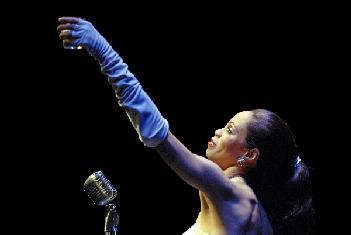SITE GUIDE
REVIEWS
FEATURES
NEWS
Etcetera and
Short Term Listings
LISTINGS
Broadway
Off-Broadway
NYC Restaurants
BOOKS and CDs
OTHER PLACES
Berkshires
London
California
DC
Philadelphia
Elsewhere
QUOTES
On TKTS
PLAYWRIGHTS' ALBUMS
LETTERS TO EDITOR
FILM
LINKS
MISCELLANEOUS
Free Updates
Masthead
Writing for Us
A CurtainUp DC  Review
Review
 Review
ReviewLady Day at Emerson's Bar & Grill
by Rich See
|
Music is light to me. -- Billie Holiday
|
 Lynn Sterling
(Photo: Scott Suchman) |
Arena Stage is providing some beautiful jazz with its spring production of Lanie Robertson's Lady Day at Emerson's Bar & Grill. Set in the months just before her death, Lady Day revolves around a late night concert with Billie Holiday at one of Philadelphia's most famous jazz night spots, the intimate Emerson's Bar & Grill. Backed by a simple bass trio, Holiday alternately sings, laughs and cries as she recounts her life, loves and adventures, ultimately weaving her life story into her music with a unique, seamless style.
Director Kenneth Lee Roberson has created a flowing show that attempts to call up Holiday's spirit in lieu of recreating the famed singer. Set designer Shaun L. Motley has turned Arena's small Kreeger performance space into a cabaret-like environment with café tables set up in front of the stage. It's an idea that almost works, and the theatre gets points for trying. Ironically, the theatre where Arena should be holding the run is in its Old Vat space. However, there are obviously not enough seats to cover the costs associated with the production in that blackbox environment. Too big on the one hand, too small on the other.
A couple of side notes: with this performance, patrons can take drinks into the theatre and a bar is set up in the back of the Kreeger to help handle the pre-performance sales. And for those patrons who would like to sit at the café tables, these premium seats can be purchased, or upgraded to from existing tickets, by simply calling the box office.
Michael Gilliam's lighting provides some nice effects, while Austin K. Sanderson's white silky dress and gardenia help to bring the show's Lady Day (portrayed by Lynn Sterling) into visual focus.
Mr. Robertson's writing covers the high and low points, taking us on a musical road trip through Holiday's life. He discusses her relationship with her mother "The Duchess" and experiences as a young prostitute; her tour through the south during segregation with bandleader Artie Shaw; the first of her three husbands -- trombonist Jimmy "Sonny" Monroe; the 18-year addiction to heroin; and finally her time in a federal prison for drug possession.
Along the way, we are given insight into a pre-Civil Rights Act America, where Black musicians and singers are limited in the types of music they have access to perform, to medical treatment if they somehow find their way to a hospital and to the degradations they are subjected to when entertaining white audiences.
Mr. Robertson also backdrops each aspect of Holiday's life with a corresponding song from her oeuvre, which adds a nice insight to both the music and the emotional experiences she would have called upon in performing the numbers. Thus after discussing the Artie Shaw tour, Ms. Sterling proceeds into a dark rendition of "Strange Fruit" which is about the lynchings happening in the South. Or after discussing her mother, she breaks into a wonderful "God Bless the Child," which is a song Holiday wrote after her mother refused to provide financial help because of her involvement with Sonny Monroe.
As Ms. Holiday, Lynn Sterling provides wonderful vocals with terrific enunciation and a flowing, relaxed delivery that harkens back to Lady Day. While Holiday's range was only one octave, Ms. Sterling's is obviously much greater, and she uses this vocal ability to bring energy and power into the music without sacrificing Holiday's trademark emotional delivery.
On the acting side of the performance, Ms. Sterling shows her skills as she slowly dips into a drug and alcohol induced mini-breakdown. And for the humor, she has the necessary comedic timing. All in all, she gives the audience quite a performance and they respond in kind.
Several songs she stands out on include: "'Taint Nobody's Biz-ness" (she brings out the pathos in an otherwise lively number), "Gimme a Pig Foot" (she seems to be having great fun), and the show's closing song "Baby Doll" (where she proceeds to showcase her range and power).
The only rough spots in Lady Day are the middle-of-the-road musical arrangements by Danny Holgate, which don't seem to exhibit a great deal of creativity or energy. And while William Foster McDaniel is a wonderful pianist, his line delivery as accompanist Jimmy Powers is less than satisfactory.
However these minor flaws didn't impact anyone's enjoyment the night I saw Lady Day at Emerson's Bar & Grill -- it received a standing ovation. If you are on the fence about seeing the show, you might want to consider what a patron leaned over and whispered to me during the applause: "I saw Billy Holiday in the 1950's around the time period this show is set in. And she (Ms. Sterling) got the essence of Billy!"
|
Lady Day at Emerson's Bar & Grill
by Lanie RobertsonDirected by Kenneth Lee Roberson with Lynn Sterling, William Foster McDaniel, Eric Kennedy, and Thomas E. Short, Jr. Set Design: Shaun L. Motley Lighting Design: Michael Gilliam Costume Design: Austin K. Sanderson Sound Design: Timothy M. Thompson Music Director: William Foster McDaniel Musical arrangements by Danny Holgate Running Time: 1 hour, 30 minutes with no intermission Arena Stage Kreeger Theatre, 1101 Sixth Street SW Telephone: 202-488-3300 http://www.arenastage.org TUE, WED & SUN @7:30, TH - SAT @8, SAT-SUN @2; $49 - $68 Opening 03/31/05, closing 06/04/05 Reviewed by Rich See based on 04/13/05 performance |


